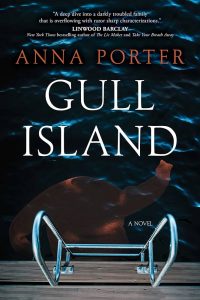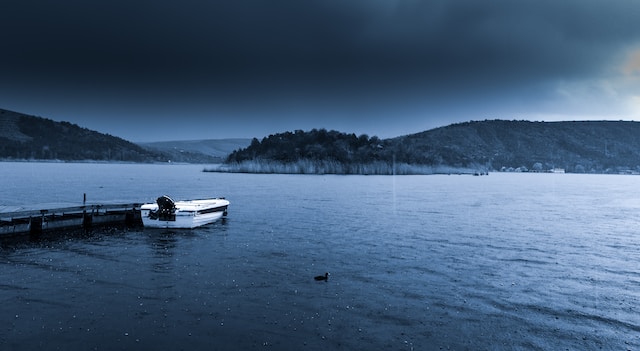
There’s a ubiquitous template for many contemporary novels and it goes something like this: “an inspiring story of an oppressed protagonist who overcomes all odds and discovers herself.” Anna Porter’s Gull Island, however, is truer to life than to aspirational, preachy fiction. It’s the story of a profoundly dysfunctional family and thirty-something Jude Bogdan’s stumbling, alcohol-drenched quest to make sense of her past — all against the backdrop of her parents’ cottage on a remote island of Georgian Bay, Ontario.
Jude, the narrator, is a moderately successful author of young adult fiction. She sells enough books to pay for a simple apartment in Toronto and to quench her thirst for wine and liquor. Drink is how she tries to deal with the trauma of her childhood and youth. Her father, at first a run-of-the-mill architect and then a millionaire businessman engulfed in shady real estate transactions, is vile and violent. He smolders with hate, has a fascistic devotion to strength and “usefulness” when assessing the value of other people or house pets, and he’s an angry atheist who despises his wife’s Roman Catholic faith. He’s emotionally and physically abusive to Jude, to her younger sister Gina and to their mother, to his son-in-law, Sammy, and to his grandson, William. Hunting, even when illegal, brings him sadistic pleasure. He’s cruel to animals, which means it can be expected that he’s cruel to humans too.
Jude’s mother is one big stiff upper lip. She’s an emotionally repressed academic living in a loveless relationship with her beastly husband, demonstrating little parental warmth to her children. She isn’t a wilting wallflower when faced with her husband’s nastiness, but she also doesn’t do much to protect her children from his cruelty. She somehow muddles through life with her spouse by using detachment as a shield. We see a softer side of her personality when caring for her dog Scoop and in her relationship with Eva — a mysterious friend of hers who is ever-present when the family spends summers at their cottage.
Jude’s father vanishes and she returns to the Gull Island cottage alone and off-season to locate his will and to hunt through old family photographs. She’s wrestling with her past, while also trying to survive the loneliness and harsh conditions on this remote island in early April. When her boat drifts away after a ferocious storm, she finds herself stranded on the island with haunting memories and hallucinations. We see everything from Jude’s point of view — both the present and the past. The plot moves back-and-forth quite seamlessly from her present predicament and mission on the island to episodes from both her childhood and from a few years ago. Yet we also come to realize that Jude isn’t always a clear-headed and reliable narrator. She seems to reach for the wine, whiskey, scotch or vodka bottles almost incessantly as she rummages through the cottage, fumbles with the water pump or with the electricity and battles demons of her past. Jude is often in various states of intoxication.
Sometimes Gull Island has the ambience of a ghost story set in the wilderness. Speaking of her mother, Jude shares: “Spirits, both shining well-lit ones and dark, evil ones, were accepted presences in her religion and we read about them in church and in her Bible. There was the Holy Ghost having his way with Mary and Satan lurking among the apples, so why not a few ghosts on Gull Island?” There were, in fact, ghosts in and around the cottage — but they were ghosts of this world. They were the ghosts of an unresolved, tumultuous past haunting the present. They were the heavy spirits of personal baggage, weighing down Jude on either side.
What weighed her down the most was the memory of her aloof, seemingly disinterested mother and her harsh, abusive father. In fact, he’s so awful in the novel that at times I had hoped for a fleeting flicker of gentleness from him, to remind me that he’s still human and not undiluted evil. There’s very little warmth in the Bogdan family and their presence casts a dark shadow over Gull Island. Even the local wildlife registers its disgust, like when a turkey vulture vomits all over Jude. What humanizes Jude’s mother, however, is her vulnerability — particularly in old age, as she struggles with dementia and relies more and more on her children. The other moments of gentleness in the novel revolve around Gina’s husband, Sammy, and their son William. Sammy is a caring, good father to his special needs son. At times, William draws out a maternal instinct from Jude.
Gull Island has a relatively small cast of characters. Combined with the remote location, the chilly early spring and the slow-burn feel, it all makes for a cosy read. It also explores the deceptive nature of perception and our tenuous, limited grasp of reality. Seen through the eyes of a young child, or perhaps a naive visitor, the summers at the family cottage may have appeared idyllic, even when the adults seeking refuge there lived tortured lives.
Anna Porter writes of Georgian Bay cottage life from personal experience. She and her husband Julian have spent many summers there and the novel includes the tasks of cottage life, some not entirely pleasant, that may not be evident to urban readers who associate cottages with only tranquility and relaxation. She also wrote this novel at the height of the pandemic — a quiet, lonely and uncertain time when our world became much smaller and when all of us, to varying degrees, inhabited our own islands.

Be First to Comment